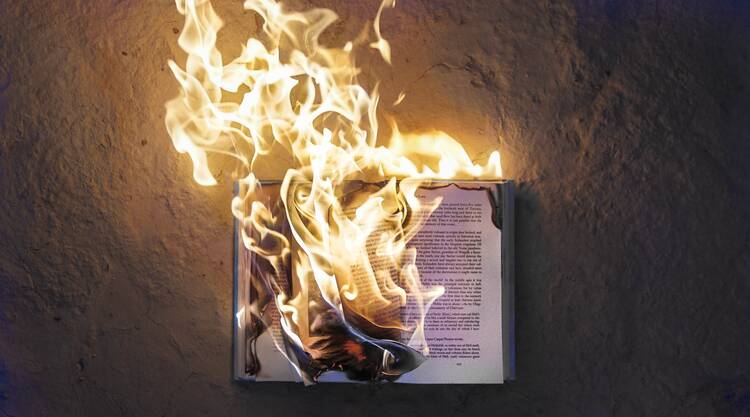Banned! The news last week that Art Spiegelman’s 1986 Holocaust graphic novel, Maus: A Survivor’s Story, was removed from school curricula by a Tennessee school board (for obscenity and nudity, the latter involving not humans but…mice) was reminiscent of one of our country’s favorite pastimes: banning books. The American Library Association reports that it received an unprecedented 330 “book challenge” reports last fall, typically involving books dealing with issues that are flashpoints in national cultural battles: gender, gender identity and social mores. The movement will probably backfire – it almost always does – and Maus is already climbing the best-seller rankings, 36 years after its publication.
The news that Maus, a graphic novel about the Holocaust, had been pulled from school curricula by a school board in Tennessee reminded us of one of our nation’s favorite pastimes: book bans.
One of the most famous novels banned in the United States is that of James Joyce. Ulysses, which for nearly 12 years after its publication in 1922 was banned in the United States. When the ban was finally lifted in December 1933, a fierce opponent of its publication was AmericaLiterary editor at the time (and editor from 1936 to 1944), Francis X. Talbot, SJ in a 1934 essay in the magazine:
The book was written in a new technique, in a pseudo-English, sometimes normal, sometimes foreign, sometimes archaic, sometimes simply a succession of letters, meaningless and inane. Many of the words were filthy, scrofulous, putrid, like the excrement of the spirit. The words are listed in the dictionary, but never in the writings or on the tongue of anyone except the lunatics or the lowest human dregs. The critics said what courage. Sexual neurotics said it was beautiful. The normal person said I’m sick.
Ultimately, Talbot said, Joyce would not be a topic of discussion for long, as the book was not of a quality that would merit it to any audience apart from those simply looking to be teased. or amused. “Only a person who had been a Catholic, only a person with an incurably sick mind, could be so diabolically venomous towards God, towards the Blessed Sacrament, towards the Virgin Mary. But the ‘Ulysses’ case is closed,” a- he wrote. “All the curiosity caused by the extraneous circumstances of his ban is over. It has now shrunk to a single book. It will be discussed, no doubt, in the small literary pools of amateurs and young radical Catholics. But for the most part, it’s in the grave, fragrant.
Well, Father Talbot may have been wrong about the book’s lasting influence, but no one could doubt its verve. I suspect Joyce would rather like it if they had met before. But it’s a dangerous thing to advocate for a book to be banned, because at the end of the day the crowd can be somewhat indiscriminate about who they’re from. Maus was ostensibly banned for the same reason as Ulysses– a vague idea that it was obscene – but what if the real motivation was that it was about the Holocaust?
One could come up with a dozen reasons in half a minute to ban almost everything we read in school: finn blueberry is racist, just like CS Lewis narnia novels. Dr. Suess is about to be canceled; Judy Blume is a regular on the list of books parents grab their pearls for when they find them in the school library. But isn’t it okay, once in a while, for our children to read something disturbing?
This problem raised its head at, of all places, Duke University in 2015, when students and parents complained that required reading for incoming freshmen, Alison Bechdel’s graphic novel fun house, was pornographic and promoted alternative lifestyles. I wrote about the kerfuffle in America at the time (it was worthless; students fearing they would be outraged by the book were allowed to withdraw), and thought back to the church‘s long history of book banning.
“Our irony, in the world of Catholic literature and academia, is that no group should fear the good intentions of censors more than Catholic intellectuals themselves,” I wrote then. “Not so long ago, Rome was actually listing Graham Greene and other novelists on the Index of Banned Books, not to mention academic theologians silenced by the Congregation for the Doctrine of the Faith. Why? Because good Catholics needed protection from harmful literature.
“Laughable, isn’t it? That we once thought so little of people that we thought they would be permanently damaged if they read the wrong thing.
You could come up with a dozen reasons in half a minute to ban almost everything we read in school.
•••
In this space each week, America features literary reviews and commentary on a particular writer or group of writers (new and old; our archive spans over a century), as well as poetry and other offerings from America Media. We hope this gives us the opportunity to provide you with more in-depth coverage of our literary offerings. It also allows us to alert digital subscribers to some of our online content that does not appear in our newsletters.
Other sections of the Catholic Book Club:
Good reading!

